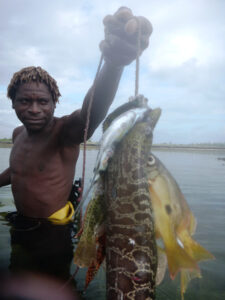
By Robert Sluka
There has been a huge amount of coverage around the recent Netflix documentary ‘Seaspiracy’, released at the end of March. It quickly broke into the Netflix ‘Top 10’ most watched list in multiple countries. It stoked controversy. On the one hand, it has generated conversation and interest among its popular audience, with many people declaring they will stop eating seafood entirely as a result of watching the documentary. On the other hand, there has been widespread backlash from NGOs, fishing companies, and media outlets examining the one-dimensional presentation of a complex, multi-faceted issue.
Despite the importance of the topic that ‘Seaspiracy’ addresses, the solution it advocates—ending the consumption of seafood—is not an option nor a desirable solution to ocean health. It is just not that simple. Those of us with privilege can choose to not eat seafood, eat lower on the food web, or eat from sustainable sources. But for many, their daily bread (fish) is critical and life-giving. Coastal populations around the world depend on seafood as a vital part of their diet. Ultimately, ‘Seaspiracy’ works on sensationalism, and in the midst of this, it has completely undermined frontline efforts to build sustainable food systems around the world in communities where seafood is historically, culturally, and economically important.
So, where do we go from here?
We have developed relationships with the ocean on the premise it is an inexhaustible, indestructible commons. We know now that this is simply not true. Fishing is devastating the ocean’s biodiversity and abundance, several methods destroy fragile habitats, fishers are exploited, and the poorest suffer most from reduced nutrition. But we must also address climate change, pollution (including plastic), land-use changes, and invasive species all the while ensuring livelihoods, wellbeing, and nutrition for coastal populations. We need a response that is able to accommodate the complexities of habitats and treats human populations not merely as consumers. One that doesn’t just try to keep people out but helps all creation, human and non-human, flourish; a response which values and understands interdependent relationships. One policy proposal within marine conservation is to establish marine protected areas (MPAs), safeguarding some areas on the ocean as ‘no-take’ areas, and managing the remainder sustainably. Wisdom literature exhorts us to show humility as creatures ourselves before the God of creation and his ways. We hope for a future where we learn to live humbly and sustainably alongside and in the midst of the oceans and the creatures God has made.
Things you can do –
- We’d recommend watching ‘End of the Line’ instead of ‘Seaspiracy’. If you prefer reading, Prof. Callum Roberts’ The Unnatural History of the Sea is excellent.
- Learn about the ocean, marine protected areas, and particularly about the coastline nearest you and build connections with those who are already working there.
- Use existing sustainable seafood guides to plan a low-impact ocean meal and invite your friends and a local marine biologist to discuss these issues together.
- Study and read about the theological and ethical issues related to the ocean.
_____________
Robert D Sluka, Ph.D. leads A Rocha’s Marine Conservation Program. He is a curious explorer, applying hopeful, optimistic, and holistic solutions to all that is ailing our oceans and the communities that rely on them. Robert’s research focuses on marine biodiversity conservation, plastic pollution, and fisheries, particularly marine protected areas. The ultimate goal is to glorify God through oceans and communities being transformed using holistic marine conservation.
You can purchase Bob’s Grove Book on MPAs here and look out for his upcoming Grove Book on how plastic pollution can hurt or heal relationships.
You can access the Plastics Toolbox here.
This blog post was originally posted on the A Rocha International blog.








Add a Comment